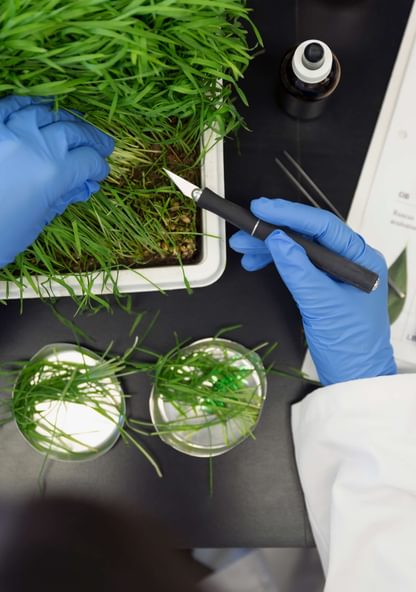
Why Choose a General Biology Major at ËżąĎĘÓƵ?
The General Biology major at ËżąĎĘÓƵ provides a comprehensive foundation in the life sciences, perfect for students who want flexibility in their studies and a wide range of career options after graduation. This program explores the structure, function, and development of living organisms—from the molecular level to entire ecosystems.
Students gain hands-on experience in the lab and field while studying topics like genetics, microbiology, ecology, and physiology. With small class sizes and experienced faculty, students benefit from personalized instruction and research opportunities that prepare them for the next step—whether that’s entering the workforce or pursuing graduate or professional school.
The General Biology track is ideal for students interested in careers in healthcare, education, environmental science, or research, as well as those planning to continue their education in medicine, veterinary science, or other health-related fields.
At ËżąĎĘÓƵ, you’ll gain the scientific knowledge and critical thinking skills to thrive in a variety of biology-related careers.
What You’ll Learn
The Biology major at ËżąĎĘÓƵ offers a broad and rigorous education in the life sciences, designed to prepare students for careers in healthcare, environmental science, education, research, and more. Students benefit from a curriculum grounded in laboratory investigation, fieldwork, and ethical inquiry. Whether pursuing a general biology track or a specialized emphasis like pre-professional health or environmental biology, students gain a strong foundation in biological theory and scientific practice that supports both graduate study and career readiness.
As a Biology major at ËżąĎĘÓƵ, you will:
Develop a strong understanding of biological principles across key domains including genetics, evolution, cell biology, anatomy, physiology, and microbiology.
Gain hands-on experience in laboratory and field settings, conducting experiments, collecting and analyzing data, and presenting scientific findings.
Apply the scientific method and critical thinking skills to solve complex biological problems and evaluate current research and ethical issues in science.
Explore interdisciplinary connections between biology and fields such as chemistry, environmental science, and health sciences through elective and required coursework.
Build a foundation in scientific communication by preparing professional-quality lab reports, research papers, and oral presentations.
Tailor your studies with specialized tracks such as Field/Environmental Biology, Pre-Professional Health, or Biology Education, aligning your education with your career goals.
Complete a capstone experience that synthesizes learning across the major, showcasing your skills and knowledge as you transition into the professional or academic world.
Career Possibilities
Biological Technician
Work in laboratories supporting scientists by setting up experiments, collecting data, and maintaining equipment. Common in pharmaceutical companies, medical research labs, and environmental agencies.
- Typical Education: Bachelor’s degree in biology or related field
- Median Salary: $52,000
- Job Outlook: 7% growth (2023–2033)
Microbiologist
Study microorganisms such as bacteria, viruses, fungi, and algae to understand their impact on humans, animals, plants, and the environment. Often employed in public health, pharmaceuticals, or agriculture.
- Typical Education: Bachelor’s degree for entry-level; advanced degrees for research roles
- Median Salary: $84,400
- Job Outlook: 5% growth (2023–2033)
Environmental Scientist
Analyze environmental problems and develop solutions to protect natural resources and human health. May work in government agencies, consulting firms, or nonprofit organizations.
- Typical Education: Bachelor’s degree in environmental science, biology, or chemistry
- Median Salary: $80,060
- Job Outlook: 6% growth (2023–2033)
Medical Laboratory Scientist
Conduct lab tests to diagnose diseases, monitor patient health, and support medical decisions. Works in hospitals, diagnostic labs, and research facilities.
- Typical Education: Bachelor’s degree in biology or medical laboratory science
- Median Salary: $57,380
- Job Outlook: 5% growth (2023–2033)
Related Degrees and Programs
If you’re interested in this degree or program, here are others you might find intriguing.
See All



